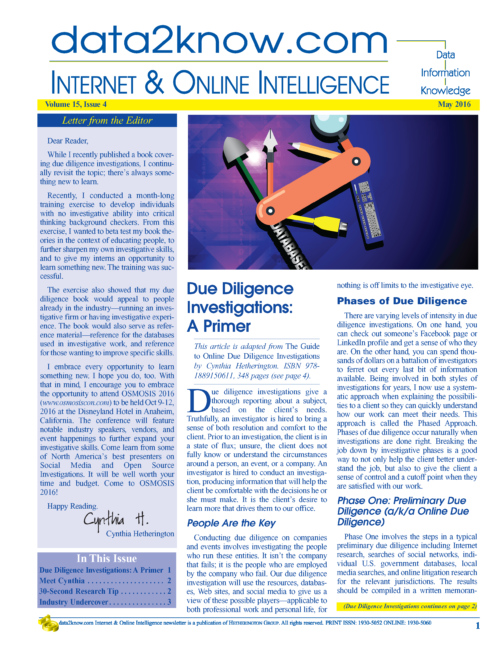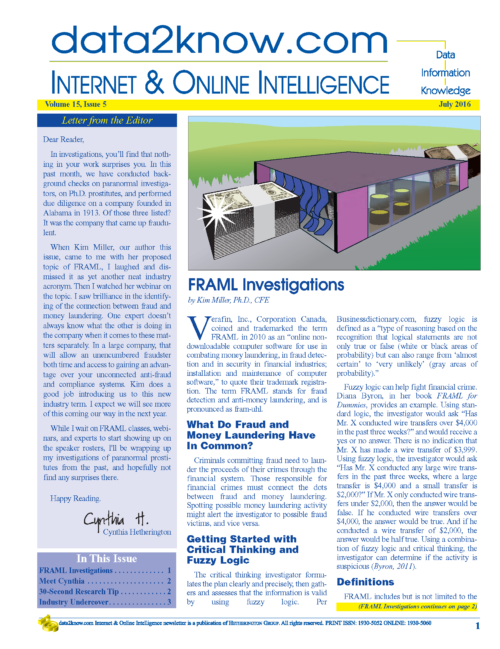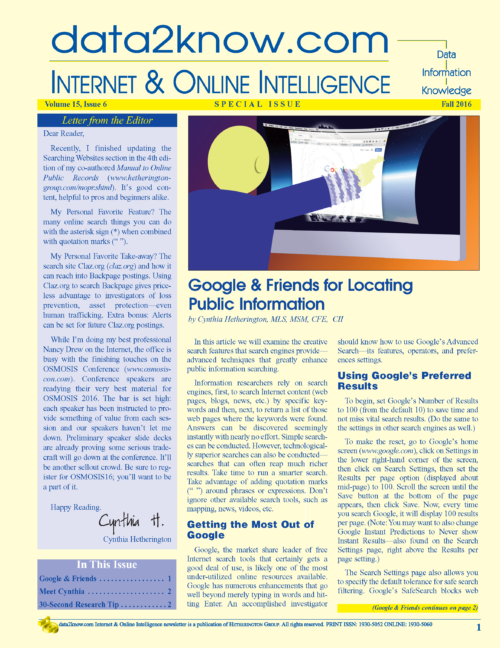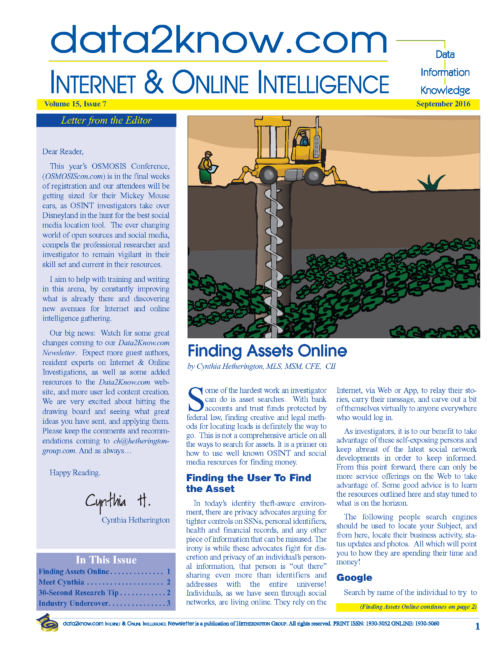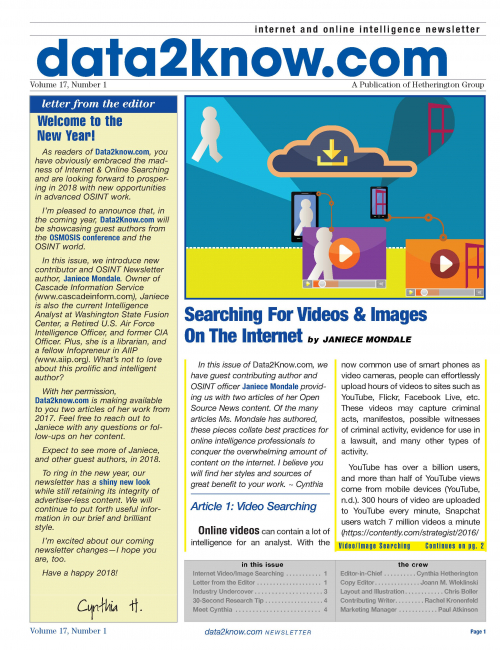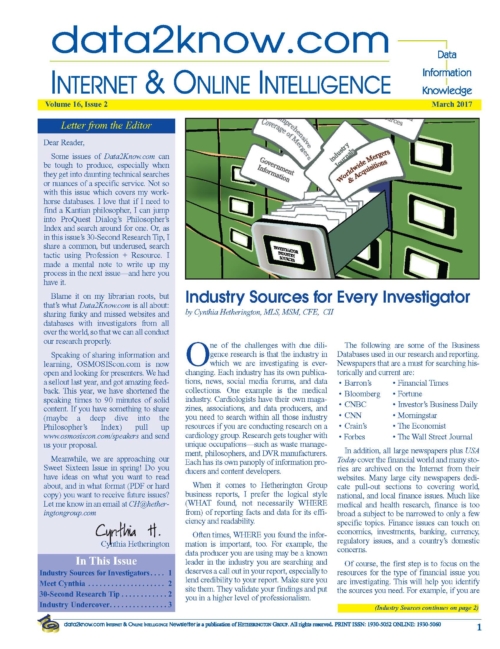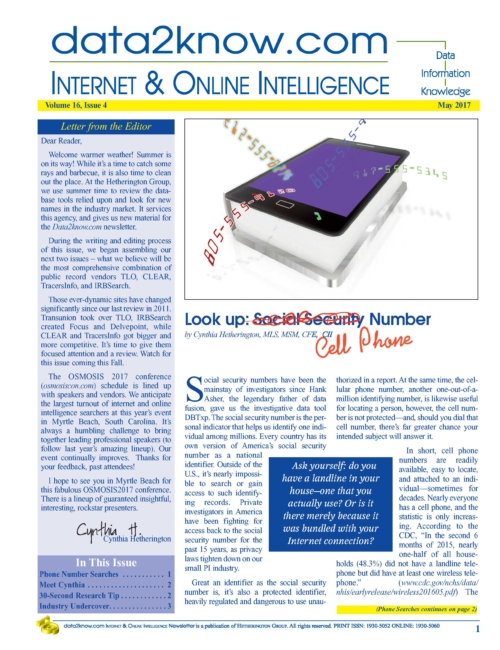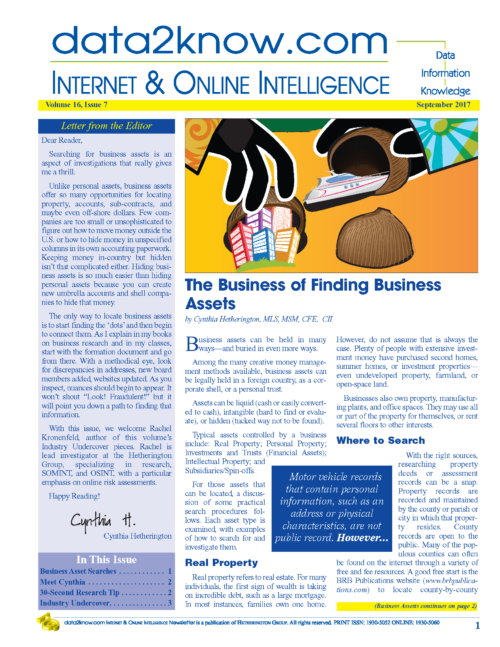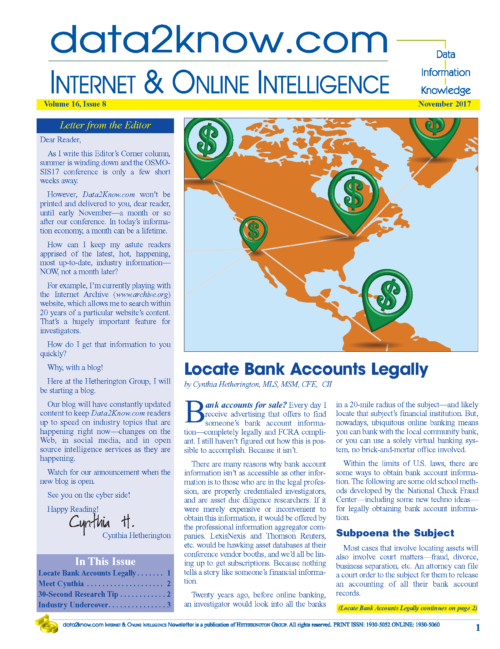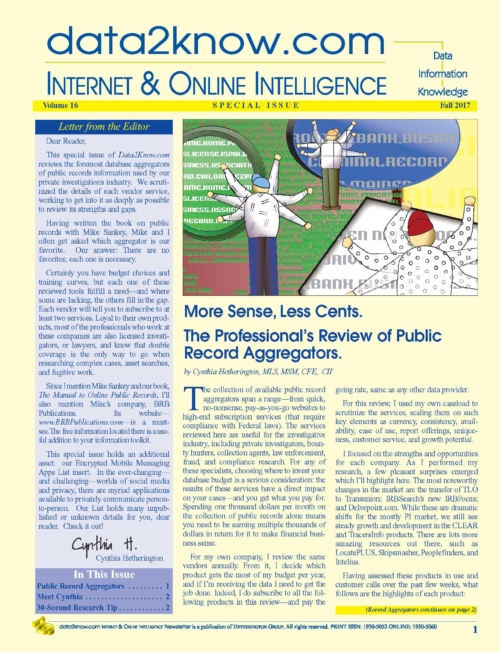-
Data2Know Vol. 15, No. 5
$15.00FRAML Investigations
The term FRAML stands for fraud detection and anti-money laundering. Criminals committing fraud need to launder the proceeds of their crimes through the financial system. Those responsible for financial crimes must connect the dots between fraud and money laundering. Spotting possible money laundering activity might alert the investigator to possible fraud victims, and vice versa. -
Data2Know Vol. 15, No. 6
$15.00Google & Friends for Locating Public Information
This article examines the creative searching features and offerings provided by search engines. Using these advanced techniques greatly enhances the searching of public information. Learn how to get the most out of Google; it's preferred results, operators, symbol functions, proximity searching and more. -
Data2Know Vol. 15, No. 7
$15.00Finding Assets Online Some of the hardest work an investigator can do is asset searches. With bank accounts and trust funds protected by federal law, finding creative and legal methods for locating leads is definitely the way to go. This is not a comprehensive article on all the ways to search for assets. It is a primer on how to use well known OSINT and social media resources for finding money. -
Data2Know Vol. 15, No. 8
$15.00Protecting Your Image Online
With a good Google search, somebody can find where you live, discover your likes and dislikes, learn what you do with your free time, or what others might think of you. Perhaps even habits you would likely not want known, particularly by coworkers. It is a serious matter for anyone, professional or otherwise, concerned with their own personal security. Have you Googled yourself lately? https://www.hetheringtongroup.com/product/data2know-vol-15-no-8/ -
Data2Know Vol. 16 No. 1
$15.00Medical Assets: The Government and Your Healthcare Records In this issue we are examining the most sensitive of asset information: health records. The Health Insurance Portability and Accountability Act of 1996 (HIPPA), signed into law by President Clinton, was put in action to maintain the privacy and veracity of a person’s personal health conditions. Now, twenty years later, I’m finding databases where data is purchasable via a health credit check company provider. Though HIPPA is a federal law, it is up to the states to enforce action. How secure are records, and what ways are they available to somebody seeking them? -
Data2Know Vol. 16 No. 2
$15.00Industry Sources for Every Investigator
One of the challenges with due diligence research is that the industry in which we are investigating is ever-changing. Each industry has its own publications, news, social media forums, and data collections. One example is the medical industry. Cardiologists have their own magazines, associations, and data producers, and you need to search within all those industry resources if you are conducting research on a cardiology group. Research gets tougher with unique occupations—such as waste management, philosophers, and DVR manufacturers. Each has its own panoply of information producers. This article focuses on the WHERE to find information, rather than the always important WHAT. -
Data2Know Vol. 16, No. 4
$15.00Look up: Cell Phone Number
Social security numbers have been the mainstay of investigators since Hank Asher, the legendary father of data fusion, gave us the investigative data tool DBTxp. The social security number is the personal indicator that helps us identify one individual among millions. The cellular phone number, another one-out-of-a million identifying number, is likewise useful for locating a person, however, the cell number is not protected—and, should you dial that cell number, there’s far greater chance your intended subject will answer it. -
Data2Know Vol. 16, No. 5
$15.00Public Records Search Pitfalls
This article focuses on some of the pitfalls that the modern investigator needs to be wary of when it comes to public record searching. Learn some of the issues you may come across and how to avoid them. Additional commentary from experts in the public records fields gives further insight into the public records industry. -
Data2Know Vol. 16, No. 7
$15.00The Business of Finding Business Assets Business assets can be held in many ways—and buried in even more ways. Among the many creative money management methods available, business assets can be legally held in a foreign country, as a corporate shell, or a personal trust. Assets can be liquid (cash or easily converted to cash), intangible (hard to find or evaluate), or hidden (tucked way not to be found). Typical assets controlled by a business include: Real Property; Personal Property; Investments and Trusts (Financial Assets); Intellectual Property; and Subsidiaries/Spin-offs. For those assets that can be located, a discussion of some practical search procedures follows. Each asset type is examined, with examples of how to search for and investigate them. what you pay for. -
Data2Know Vol. 16, No. 8
$15.00Locate Bank Accounts Legally
Bank accounts for sale? Every day we receive advertising that offers to find someone’s bank account information—completely legally and FCRA compliant. It's still hard to figured out how this is possible to accomplish. Because it isn't. So what ways are legal, ethical and will get results? -
Professional's Review of Public Record Aggregators
The collection of available public record aggregators span a range—from quick, no-nonsense, pay-as-you-go websites to high-end subscription services (that require compliance with Federal laws). The services reviewed here are useful for the investigative industry, including private investigators, bounty hunters, collection agents, law enforcement, fraud, and compliance research. For any of these specialists, choosing where to invest your database budget is a serious consideration: the results of these services have a direct impact on your cases—and you get what you pay for.

